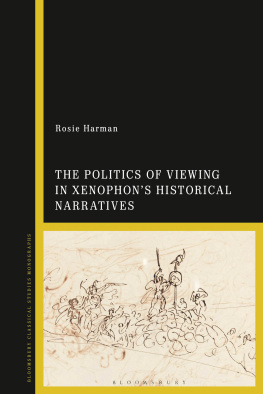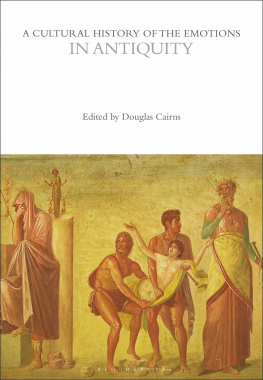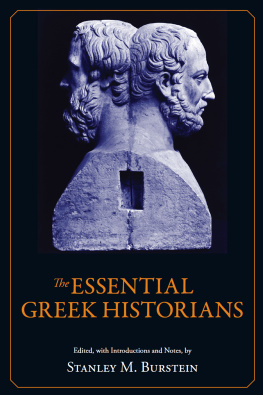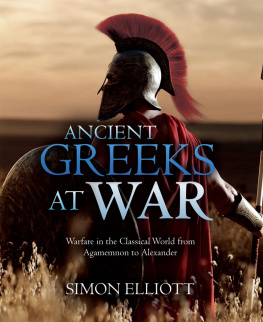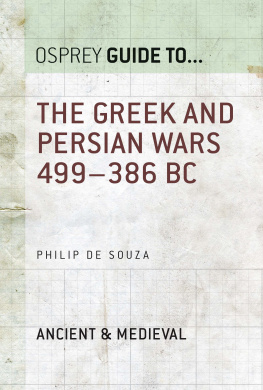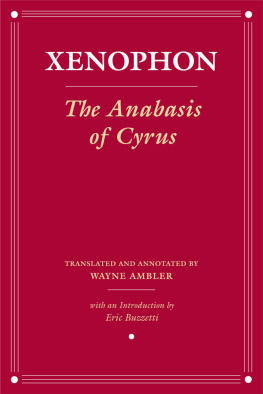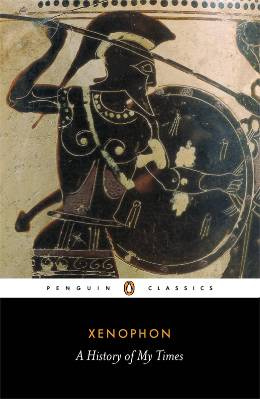
The Politics of Viewing in
Xenophons Historical Narratives
For David and Peter, with all my love
Also available from Bloomsbury
American Anabasis: Xenophon and the Idea of America from the Mexican War to Iraq, Tim Rood
Anticipation and Anachrony in Statius Thebaid, Robert Simms
Imagining Xerxes, Emma Bridges
Xenophon, Fiona Hobden

Contents
My interest in Xenophon began when I was studying as a PhD student as part of Professor Stephen Hodkinsons Arts and Humanities Research Council funded project Sparta in Comparative Perspective at the University of Nottingham (20059), and my first debt of gratitude is to him, for his unwavering kindness, encouragement and support, both then and in subsequent years; he has been a true mentor and friend. I am also most grateful to Professor Tim Whitmarsh who showed immense generosity with his time and in his support and encouragement of me during my PhD years.
The production of this work has benefitted from research funding from the British School at Athens (who granted me an Early Career Fellowship in 2014) and from the Greek and Latin Department at University College London (who have granted me generous research funding and leave), and I am delighted to acknowledge and thank them. I am particularly grateful to my UCL colleague Professor Phiroze Vasunia for his kindness and support in reading and advising me on earlier versions of this work. I would also like to thank Professor Christopher Pelling for kindly reading and commenting on one of the chapters, and Bloomsburys anonymous peer reviewer for their helpful suggestions.
On a personal note, I wish to thank my dear friend Dr Cosetta Cadau for her encouragement of me in this project. Finally, I wish to thank David Mabb, who has suffered though many years of late night conversations about Xenophon, and without whom this book would never have been completed. It is dedicated to him, and to our son Peter, with all my love.
This book examines ideological tensions in ancient Greece in the early fourth century BCE through a reading of Xenophons varied works of narrative history, the Hellenica, Anabasis and Cyropaedia. These texts deal with highly contentious subject matter: the representation of conflicts between Greek states, conflicts between Greeks and non-Greeks, especially Persia, relations between the elite individual and society, and concepts of community, power and imperialism. Whether narrating stories of the more distant or more recent past, these texts pose serious questions for the early fourth-century readers understanding of their contemporary world.
In all three texts, politically significant moments are imagined in highly visual terms. Such descriptions transform the historical action into a series of sights, and the historical agents into spectators. We can ask how this transformation of historical narrative into spectacle affects its reading. What interpretative frame is offered by Xenophon in his repeated reference to the visual qualities of the events he describes, especially given the highlighting, through their spectacularization, of moments of violence or the self-promotion of figures of power moments which may well strike the reader as politically challenging or contentious?
This book will suggest that, through the use of visualization, the narrative draws the reader into the conflicts depicted, encourages them imaginatively to place themselves in the position of the historical protagonists and challenges them to respond to unfolding events. Through being allowed to view events from different perspectives, and therefore to occupy multiple, often conflicting, political positions, the reader not only experiences for themselves the problems faced by historical actors but becomes engaged in the political conflicts acted out in the narratives. In this way Xenophons texts both reveal and enact, I will suggest, conflicts within elite Greek political self-consciousness in the late Classical period.
Xenophons historical narratives are mediated through an engagement with the personalities and actions of emperors, kings or generals from centres of power such as Sparta and Persia that had been and continued to be important in shaping the early fourth-century political landscape. The reader is invited to view events through their eyes, or is confronted with responses to the sight of these figures from other historical actors, especially through being invited to experience the effects of these leaders displays of power on those they attempt to conquer or rule. The visual perspectives on offer are therefore politically various and politically conflicted. In the Hellenica we move between the perspectives of Spartans, Athenians, Thebans, Persians and other poleis and ethnicities, and are invited to contemplate the powerful visual effect that leaders on different sides have on those they lead and on those they attempt to subjugate. In the Anabasis we experience the visual perspectives of Cyrus the Younger as leader of the 10,000 Greeks, of the 10,000 Greeks as a collective, and of different ethnic factions and elite figures from within the 10,000, including that of Xenophon as historical actor all of which are frequently in contention with each other. The Cyropaedia stages and performs the power of Cyrus the Great through a repeated focus on his overwhelmingly seductive visual effect on the various peoples he subjugates in his rise to imperial conquest, which the reader too is invited to experience; but by being allowed to view Cyrus from the perspective of these different ethnicities, we are also allowed alternative ways of thinking about Persian power. In all these texts, the reading experience is often conflictual, as the reader is invited to identify with politically opposed positions in close sequence or even simultaneously.
Xenophons texts are full of unsettling juxtapositions and contradictions. His appealing, compelling representations of Cyrus the Great and Cyrus the Younger in the Cyropaedia and Anabasis as models of successful leadership indicate that in Xenophons contemporary world it was possible for a Greek audience to admire a Persian.Spartas actions in the Hellenica presents striking, visually impressive images of Spartan leaders, allowing the possibility of admiring and identifying with Spartan power; but the text juxtaposes these striking images with an expos of the political use of appearances in Greek warfare, revealing Spartan manipulation of the visual as a mechanism for the domination of other Greeks.
The contradictory aspects of Xenophons representations of cultural and political relations between and among Greeks and non-Greeks have given rise to diverse readings. Xenophon has been read as offering a sympathetic, inclusive view of foreign cultures,
This book will argue that such contradictions are not only a key part of the reading experience but reveal the inherent inconsistencies in early fourth-century conceptions of Greek identity and relations with the Persian world. In doing so, rather than attempting to reconstruct Xenophons intentions, it will be treating Xenophons texts as social products. A concern with Xenophons personal ideas or political position has dominated recent scholarship, which has often attempted to explain Xenophons works via his affiliations or life experiences. However, there is little evidence for these affiliations or experiences beyond Xenophons texts themselves; and how they might produce intentions in writing can only be a matter for speculation. More importantly, as products of a particular historical and social context, texts can carry meanings beyond the self-conscious intentions of their authors. Our interest will therefore be in what Xenophons writings can tell us about the thought of their time, whether or not Xenophon himself was aware of this.
Next page
